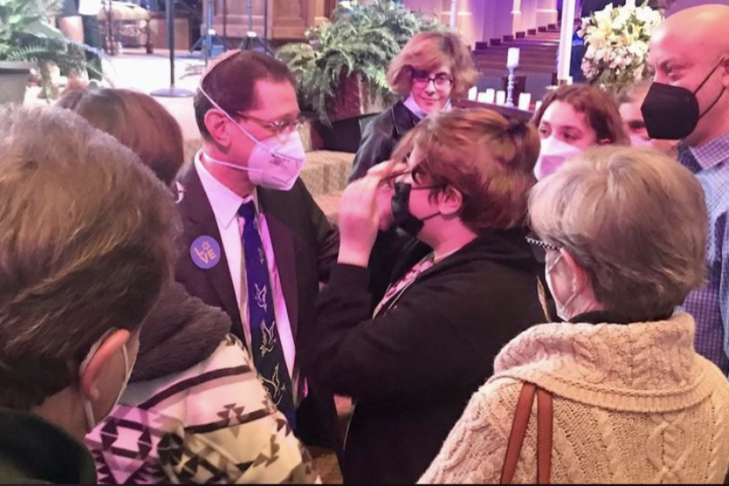This story was originally published on Jan. 17, 2022, by The Forward. Sign up here to get the latest stories from The Forward delivered to you each morning.
Like many rabbis, Charlie Cytron-Walker has presided over plenty of solidarity services around crises and tragedies. But the one he led Monday night from the pulpit of an evangelical megachurch in this Dallas suburb was different.
This time, the packed sanctuary was praying for Cytron-Walker himself—one of several people held hostage for nearly 11 hours on Saturday by a gunman demanding the release of a Pakistani woman convicted of terrorism. And this time, the victims of the attack had emerged triumphant survivors, having managed to engineer a safe escape.
“Tonight we will not be saying our traditional prayer for mourning,” Cytron-Walker said, choking up as he spoke. “No one will be saying Kaddish Yatom for me—for any of us.”
That Cytron-Walker was able to preside over this “healing and resilience” service was the result of a daring decision he made to throw a chair at the gunman and sprint out an exit with two remaining captives.
The move accorded international heroic status to a rabbi who was already beloved here for his warm manner and the interfaith relationships he had established across a suburban corridor between Dallas and Fort Worth that is home to relatively few Jews. He marveled at the outpouring of support for what he called “our small congregation in Colleyville, Texas—which no one has ever heard of before.”
Hundreds of people turned out for the service—some Jews sporting yarmulkes, others wearing Islamic headscarves—about 20 minutes’ drive from the synagogue where the horror unfolded, Congregation Beth Israel. While the synagogue remained surrounded by law enforcement, there was relatively little security at White’s Chapel Methodist Church, and no metal detectors as the crowd filed into the sanctuary with vaulted wooden arches and an imposing video screen onstage.
That welcoming spirit extended to the service, with a church song leader announcing in his heavy Texas accent, “Christians—get ready to learn some Hebrew, man,” and Cytron-Walker thanking both “religious and atheist” leaders who had supported his community.
Cantors from the region and past presidents of Beth Israel alternated songs and readings, including a poem written by a former scholar-in-residence at the synagogue after the standoff ended. “To the antisemite,” the poem read in part, “My people have seen your kind for generations. We have outlived you all.”
Cytron-Walker, wearing a blue tie adorned with doves, focused his sermon on the need to treat everyone with dignity and respect, a value he said almost everyone professed to hold but many people failed to carry out.
“If we live that value,” he said, “we might have a lot more friends that we disagree with—a lot more friends that we don’t see eye-to-eye with—but we’ll have a lot fewer enemies.”
Outside the church, television crews with a line of microphones waited impatiently in the January cold for Cytron-Walker to emerge. One joked about letting the air out of the rabbi’s tires so he couldn’t leave without speaking to them. “Too soon,” another admonished.
But after the service concluded, Cytron-Walker was busy at the head of a receiving line. Some people took selfies. Many were crying. The crowd stayed to shake Cytron-Walker’s hand or hug him even as the lights were turned up in a signal for people to head toward the exits.
Despite the intensity of the trauma and the international attention in the two days since, Cytron-Walker, who is married and the father of two teenage girls, displayed the easy charm that endeared him to so many in the community he arrived in 16 years ago. He asked an older couple about their vacation plans and pulled a family with teenage boys into a group embrace.
“Hey,” he told one of the kids, “you need to be able to process this. It’s not normal.”
When a man told the rabbi he was worried about him, Cytron-Walker laughed as he responded: “I was worried about me too!”
Another approached to say he had prayed for the rabbi.
“We needed all the prayers,” Cytron-Walker replied. “We needed all of it.”
Arno Rosenfeld is a staff writer for The Forward, where he covers U.S. politics and American Jewish institutions.
The Forward is an independent, nonprofit news organization dedicated to providing incisive coverage of the issues, ideas and institutions that matter to American Jews.
This post has been contributed by a third party. The opinions, facts and any media content are presented solely by the author, and JewishBoston assumes no responsibility for them. Want to add your voice to the conversation? Publish your own post here. MORE


